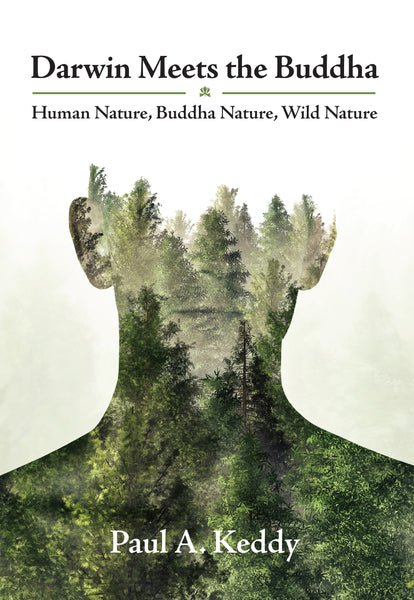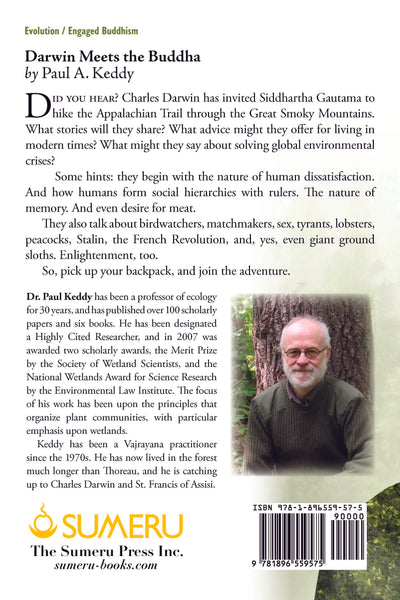Darwin Meets the Buddha
by Dr Paul A. Keddy
ISBN 9781896559575
6 x 9, 242 pages, illustrated, with index
“The idea that there are insights which both Darwinian biology and Buddhism share is an exciting one; even more so is the realization how relevant they both are to the current ecological challenges facing humankind. An easy book to read, and often a wise one; I highly recommend it.” Richard Bryan McDaniel, author of The Story of Zen.
Did you hear? Charles Darwin has invited Siddhartha Gautama to hike the Appalachian Trail through the Great Smoky Mountains. What stories will they share? What advice might they offer for living in modern times? What might they say about solving global environmental crises?
Some hints: they begin with the nature of human dissatisfaction. And how humans form social hierarchies with rulers. The nature of memory. And even desire for meat.
They also talk about birdwatchers, matchmakers, sex, tyrants, lobsters, peacocks, Stalin, the French Revolution, and, yes, even giant ground sloths. Enlightenment, too.
So, pick up your backpack, and join the adventure.
Contents
Introduction
The Men and Their Theories
1. Craving for Resources: Desire, Dissatisfaction, and Suffering
2. Living an Illusion: Mind as Cocoon
3. The Primate Prison: The Origin of Self
4. Selective Memory: Maintaining the Illusion
5. The Urge to Impress: Priests, Kings, and Dominance Hierarchies
6. Killing Minds and Killing Fields: Interference, Competition, and Aggression
7. Insatiable Consumption: When Big Brains Meet Big Animals
8. Getting Along: An Ecological View of Compassion
9. A Brief History of Life: Co-operation and Community
10. Meditation in Action: Seeing Through the Simulation
11. Enlightened Society: The Evolutionary Imperative
Acknowledgments
Appendix: How to Start Now
Further Reading
Figure Credits
Index
Attempts to bring science into Buddhism usually mention not biology but physics, and the ‘physics’ is often just painfully inaccurate or an irrelevant use of words, such as relativity or quantum mechanics. We are, however, biological beings, and in this book Keddy focuses on human biology and behaviour and how this relates to engaged meditation practice altogether.
To put it another way, this book contrasts and compares Darwinian and Buddhist views on our current reality and how we got to this point. Where their views converge presents us with the opening for a green practice path.
About the Author
Dr. Paul Keddy has been a professor of ecology for 30 years, and has published over 100 scholarly papers and six books. He has been designated a Highly Cited Researcher, awarded the National Wetlands Award for Science Research by the Environmental Law Institute, and recognised by the Society of Wetland Scientists with the Lifetime Achievement Award. The focus of his work has been upon the principles that organize plant communities, with particular emphasis upon wetlands.
Keddy has been a Buddhist practitioner since the early 1980s. He has lived in the forest much longer than Thoreau, and he is catching up to Charles Darwin and St. Francis of Assisi.
Accolades
The natural world, with all its complexity, has always been a source of joy and inspiration for me and these emotions form the foundation for my art. This book explores nature and our relationship to it from many intriguing ways. With a gentle manner Dr. Keddy leads the reader through a sequence of topics to both challenge our assumptions and encourage a deeper appreciation of our relationship to the natural world we share with all life. Howard Coneybeare, fine artist
This is one of those books you want to start over again as soon as you finish it. If the Buddha and Darwin hiked together along the Appalachian trail, what topics would they discuss? The beginning of the Buddhist journey is to know oneself; what Darwin has to contribute is that to know oneself one also needs to know the evolutionary conditioning factors which formed the type of beings we are. Very readable and often very wise. Richard Bryan McDaniel, Zen Buddhist historian
Engaged Buddhists, Green Buddhists and now the entire world are pointing to a new way of understanding the systemic challenges we face, from covid-19 to climate change. This book takes a deep ecology dive into Darwin and Buddha and reveals many congruencies worth exploring. We can't save ourselves without saving the planet. We can't save the planet unless we understand how it works and how we work. Good stuff here. John Negru, environmental activist







